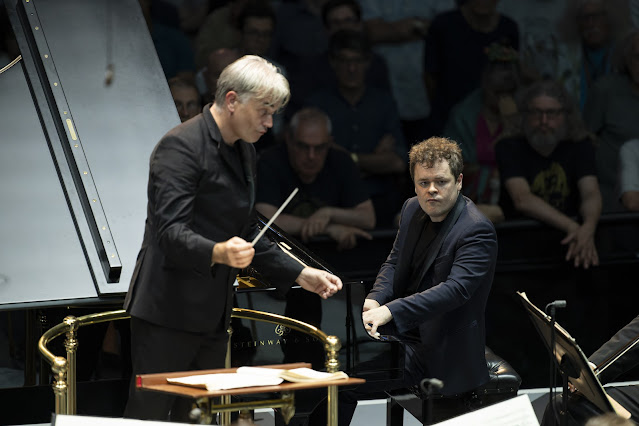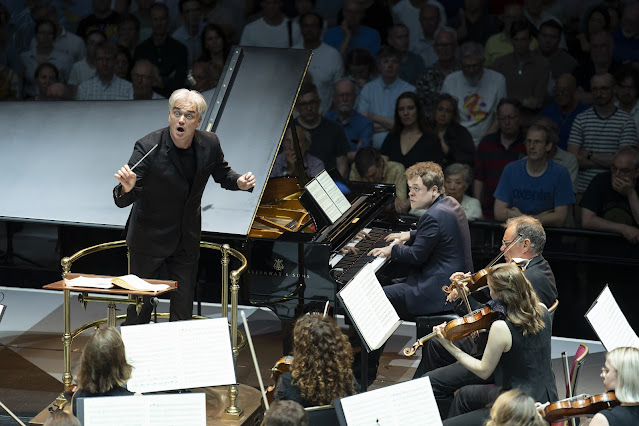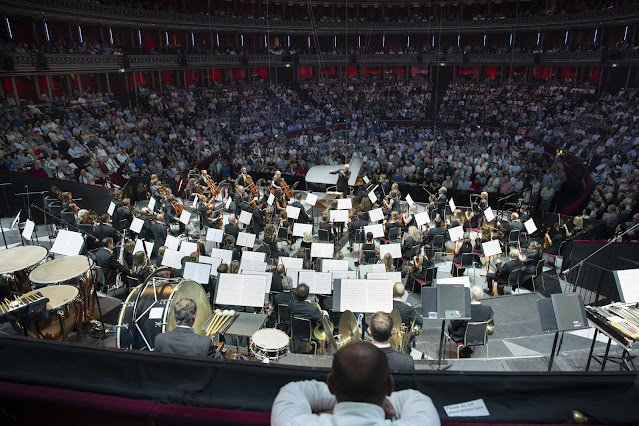 |
| Busoni: Piano Concerto – Benjamin Grosvenor, London Philharmonic Orchestra, Edward Gardner – BBC Proms (Photo: BBC/Andy Paradise) |
Rachmaninoff: Symphonic Dances, Busoni: Piano Concerto; Benjamin Grosvenor, London Philharmonic Orchestra, Edward Gardner; BBC Proms at the Royal Albert Hall
Reviewed 5 August 2024
Problem, what problem. Busoni’s mammoth Piano Concerto turned into riveting symphonic theatre in what was only the work’s second Prom performance after a gap of 36 years!
Ferruccio Busoni’s Piano Concerto is such a significant undertaking that the work is rarely part of the regular concert repertoire. What is a surprise, is to find that it has not been a regular part of the BBC Proms repertoire either. On Monday 5 August 2024, Benjamin Grosvenor was the soloist in a performance of Busoni’s Piano Concerto at the BBC Proms at the Royal Albert Hall with Edward Gardner conducting the London Philharmonic Orchestra, and this was only the second performance of the work at the Proms, a reflection perhaps of the status of Busoni’s music in the later 20th century than the work’s challenging nature.
 |
| Busoni: Piano Concerto – Benjamin Grosvenor, London Philharmonic Orchestra, Edward Gardner – BBC Proms (Photo: BBC/Andy Paradise) |
The programme began with a very different 20th century orchestral icon, Rachmaninoff’s Symphonic Dances, his final major composition and the only work written in its entirety whilst he was living in the USA. But it is a work of intense nostalgia for the lost Russia, with the motifs taken from Russian church music alongside the famous Dies Irae. The work can sometimes come over as a lush romantic romp, but though it uses a large orchestra Gardner kept things on a tight rein here. There was a clarity to the textures allied to a discipline in the rhythm and focus, which mean that the extensive and lavish woodwind writing, often in counterpoint or countermelody to the strings, was always clear and contributed strongly. Gardner brought out the strong character of each movement, rather than the romantic nostalgia.
The first movement’s main theme was all tight rhythms and focus, bringing intensity to the energy and though climaxes were vivid, things always died back down. The saxophone solo in the middle was wonderfully elegant, suave almost, and there was elegance too, to the strings when they took up the melody. The discipline and energy returned, transformed at one moment into warm string melody, but then the movement’s mysterious opening returned at the end. There was a danse macabre feel to the middle movement, contrasting with the gorgeous oboe solo, yet always a sense of dancing on the abyss. Gardner did not make the music completely demented, we had moments to savour, and at the end the dancing evaporated into nothing. The final movement seemed to move between creepy terror and vivid ,light energy, with a real sense of an underlying story. Commentators refer to this movement as a struggle between Death (the quotations from the Dies Irae) and Resurrection (quoting from the composer’s All Night Vigil), but here the Dies Irae quotations felt almost demented. The ending, picking up new rhythm and impetus, careered to the end.
Whilst the solo part in Busoni’s Piano Concerto is immensely challenging, it offers little in the way of bravura display and frequently it is the orchestra that introduces and develops the thematic material. The work is often best understood as a symphonic piece, that happens to have a piano part, and whilst much of Busoni’s output could be forward looking, this work also looks back. In a way, this performance felt like a sequence of Liszt’s tone poems, with the piano playing a similar role to the soloist in Liszt’s Piano Concerto No. 2 which is akin to the tone poems.
Benjamin Grosvenor gave a tireless and compelling performance, the way he seeming ate up all the challenges, relished the sound world Busoni was creating and formed a superb partnership with Gardner and the orchestra. This was a thrilling ensemble performance, there was never a moment when you felt they were trying to make the work something that it wasn’t.
The opening movement’s long symphonic prelude was wonderfully restless, with a great deal going on underneath. Throughout the work, Busoni’s love of complexity and counterpoint was noticeable. When the piano finally entered we had hints of Brahms and of Liszt’s Totentanz, but overall we were listening to Busoni’s fascinating exploration of new worlds. The restlessness apparent at the opening, only calmed in the final pages with a quiet but satisfied end. The second movement, Pezzo giocoso was only slightly ‘giocoso’. There were hints of Rachmaninoff (pre-echoes), and plenty of flash and dazzle with the kaleidoscopic opening and closing sections, but even in the slower middle section there was colour and movement. The third movement, Pezzo serioso, is almost a whole concerto in its own right. Powerful and intense orchestral counterpoint led, finally, to the piano’s rather thoughtful entry including a rather striking dialogue with brass chorale. Rich harmonies and intense rhythms led to a break, and then the return of the incessant melodies. Just when things get serious, Busoni introduces some piano dazzle, and by turns the music was thundering and thoughtful. Gardner and Grosvenor really emphasised the quixotic moods of this movement, and towards the end everything evaporated but then led to a final sequence of symphonic counterpoint.
The fourth movement is the Tarantella, here dark with tight rhythms. This was an intense dance, with non-stop piano part pushing ever onwards. After a little easing up in the middle, the tight rhythms returned with Gardner and the orchestra relishing the way Busoni throws everything into the mix, including an Italian marching band, going helter-skelter to a crazy conclusion. The finale features a male chorus. Here the men of the London Philharmonic Choir and the men of the Rodolfus Choir, a goodly number but it needed to be because they were positioned far above us in the balcony, unseen by most. The result was strong, yet distant, with a degree of lack of focus to the choral sound. I think I would have preferred a smaller, stage-bound chorus with a stronger presence. The dark prelude of the movement featured fine orchestra counterpoint weaving around near static piano arpeggios, and then the chorus came in the effect was similar as the orchestra wove their way around the chorale. The piano was almost incidental in this movement, and the final mad dash for the ending almost felt as if Busoni was remembering finally that there was a soloist.
 |
| Busoni: Piano Concerto – Benjamin Grosvenor, London Philharmonic Orchestra, Edward Gardner – BBC Proms (Photo: BBC/Andy Paradise) |
Busoni’s Piano Concerto is not an everyday work, but there is no reason why it should not occur a bit more. The last performance at the Proms was in 1988! Grosvenor, Gardner and the London Philharmonic Orchestra demonstrated that in the right hands it makes a piece of riveting symphonic theatre. The concert is available on BBC Sounds for two months.
Never miss out on future posts by following us
The blog is free, but I’d be delighted if you were to show your appreciation by buying me a coffee.
Elsewhere on this blog
- The encounter that never was: composers Alex Ho and Sun Keting on their collaboration on a new music theatre work interweaving the stories of two very different Chinese women – interview
- More than entertainment: Oliver Webber and the Monteverdi String Band’s The Madrigal Reimagined – record review
- Confidence, style and engagement: Rossini’s The Barber of Seville at West Green House Opera is a complete delight – opera review
- An eclectic mix: Brixton Chamber Orchestra at Clapham Park Cube – review
- Prom 10: Ryan Wigglesworth, Laura van der Heijden & BBC Scottish Symphony Orchestra in Britten, Cheryl Frances Hoad & Elgar – concert review
- She played and sang: Gillian Dooley’s new book is the fruit of 15 years research on Jane Austen’s music collection – interview
- A world away from the Bibilical oratorio: Stanford’s Whitman setting is the focus for this disc of two of large-scale choral works – record review
- A vividly realised recording: rediscovering music by Latvian-American composer Gundaris Pone – record review
- Returning to Northern Ireland Opera for his third role, British-Ukrainian baritone Yuriy Yurchuk on Tchaikovsky’s Eugene Onegin – interview
- Relentlessly entertaining: Handel’s Acis and Galatea at Opera Holland Park rather over-eggs things but features finely engaging soloists – opera review
- Contemporary contrasts: Wolf-Ferrari’s Il segreto di Susanna & Leoncavallo’s Pagliacci in a satisfying double bill at Opera Holland Park – opera review
- Home


.jpg?w=998&resize=998,665&ssl=1)





